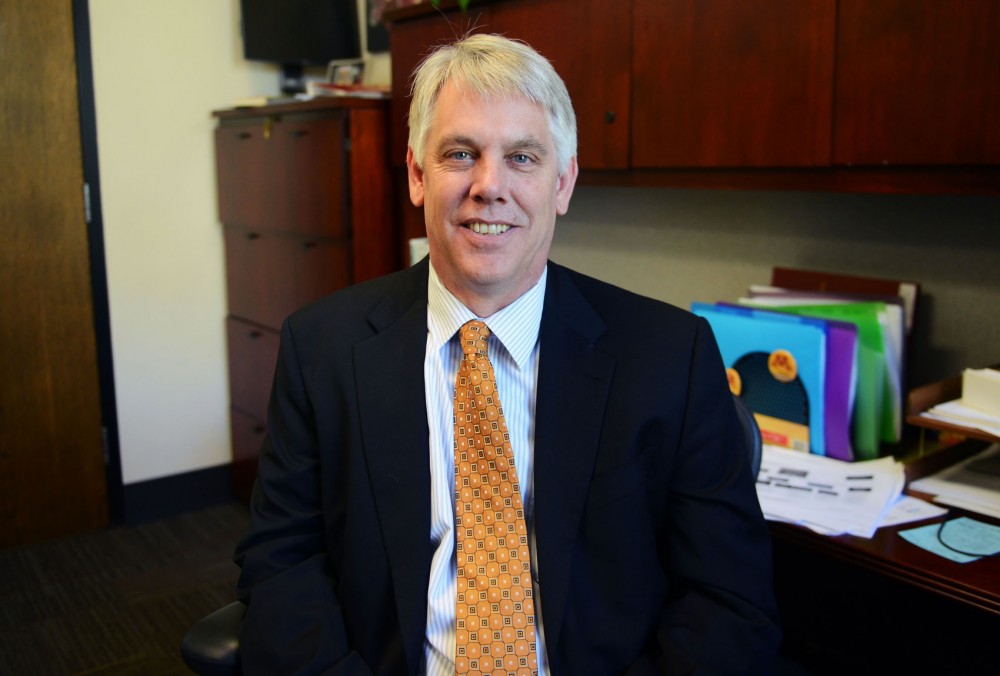Brian Buhr has played a prominent role in shaping the College of Agricultural and Natural Resource Sciences during his two decades at the University of Minnesota and will now serve as the college’s top leader.
The University named Brian Buhr the new dean of the College of Food, Agricultural and Natural Resource Sciences last week after a unique search process — in part due to a time crunch created by the failed merger between CFANS and the College of Biological Sciences.
If the merger had occurred, leadership would have shaken out differently, Buhr said, and the process couldn’t continue until University officials announced the final decision. They axed the idea in February.
Because of the five-month delay caused by merger discussions, the search committee had to work quicker than it typically would have to find a new CFANS leader, said CFANS Chief Development Officer and search committee member Cynthia Cashman.
The merger discussions spurred in part from the colleges’ previous two deans announcing their resignations last August. Unlike CFANS’s internal search process, the search committee for CBS’s dean is conducting an external, national search.
Buhr served as CFANS’s interim dean for nine months, sitting in the merger conversations. He was the only finalist for the permanent position and will assume the role June 16, pending Board of Regents approval.
Buhr said his time as a University faculty member helped prepare him for taking the new position, which includes directing the Minnesota Agricultural Experiment Station.
Cashman said although the merger delayed the search process, it had no impact on the committee’s decision to choose Buhr, whose qualifications made him an easy choice for the position.
“He is a magnetic leader, so we really felt that others were going to want to follow his lead,” she said.
Big-picture plans
After fine-tuning his leadership skills during his time as interim dean, Buhr said he’s ready to focus on larger plans for the college, like changing job descriptions and handling funding from the state and donors.
Two of CFANS’ three associate deans plan to leave by December. Buhr said he may rearrange the duties of the two positions to better accommodate CFANS students.
Currently, one oversees graduate programs and research and one handles faculty affairs and academic programs.
The college’s Associate Dean for Extension Mike Schmitt said students have been one of Buhr’s main priorities during his interim time.
“He has a commitment to students that is really passionate and very noticeable,” he said.
As many of the college’s nearly 300 faculty members are set to retire in the next few years, Schmitt said, Buhr will also have to develop a plan to ensure the college functions just as well with new faculty.
Another important responsibility of the CFANS dean and director of the Minnesota Agricultural Experiment Station is handling legislative funds, Schmitt said.
Buhr served as a liaison between the University and the state Legislature this session, when state leaders set aside bonding dollars for projects like the Aquatic Invasive Species Research Center and the Bee Lab.
“As a dean, he will be the point person to ensure the success that [legislators are] expecting and that we promise,” Schmitt said.
Besides advocating at the Capitol for state funding, Cashman said Buhr will work on creating a fundraising campaign this summer and talk with potential donors about his plans for the college.
One of the things that most interests Buhr about the position is the college’s potential to find sustainable solutions to ensure food security and combat climate change.
“We have to find high- quality, nutritious food for people,” he said. “And we have no choice but to sustain [our] resources.”
Moving past the merger
Buhr said he saw the merger discussion as an opportunity to better understand the CFANS relationship with other colleges within the University.
CFANS has departments that connect with many other University colleges, Buhr said, so it was ultimately in the college’s best interest to stay isolated.
“It was a good question to ask,” he said. “It really helped to look at what was the strategic direction of the college, where does it fit in well across the University and what some of our goals are.”
Though they didn’t merge, the two colleges will work together on future projects, current CBS Dean Robert Elde said.
Elde said he’s confident Buhr will make a great dean.
“He has a very positive attitude, a personality that brings people together, and uses those traits very effectively.”


